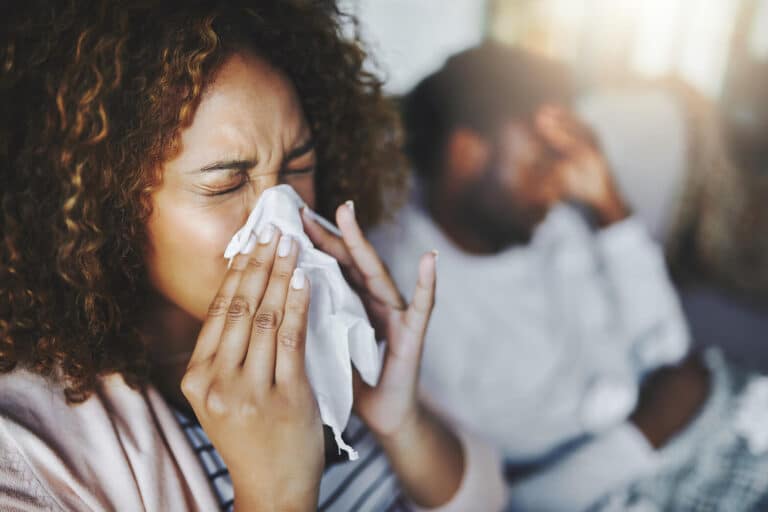There is no cure for genital herpes – an STD (sexually transmitted disease) caused by two types of viruses: herpes simplex virus type 1 (HSV-1) and herpes simplex virus type 2 (HSV-2).
People with herpes need to learn to live with it, but managing herpes is possible if you make simple changes to your lifestyle and mindset.
It is normal to be worried when you find out you have herpes, but you’re not alone. Millions of people carry the virus, and while there’s no cure, it can be treated and managed. Read on to find out why herpes comes back, as well as our essential tips for how you can take control of your life and your condition.
Why Herpes Comes Back
When a person is first infected with herpes, it travels to nerve cells near the spine and stays there, and can even remain dormant for a long time. Whenever it is triggered, it can become active again.
Factors that could cause your herpes to flare up include:
- Illness
- Hormonal changes
- Fatigue
- Genital irritation – often as a result of sexual intercourse
- Menstruation
- Physical or emotional stress
- Injury
When the herpes virus becomes active again, it travels along the nerves back to where it first entered the body, resulting in a new herpes outbreak (called a recurrence) of sores and blisters – which is one of the symptoms of herpes.
During a recurrence, you are at risk of transmitting the herpes virus to others. It’s also important to know that you can pass the virus on to someone else even when you don’t have visible symptoms like sores. The virus may be present on normal-looking skin, including right before and after an outbreak.
The pattern of outbreaks and recurrences varies widely from person to person. People can carry the herpes virus even though they’ve never had symptoms. Some may have only one outbreak or outbreaks that occur rarely. While others may experience regular outbreaks that occur every 1-4 weeks.
Managing Herpes: Treatment Options
There are things you can do at home to help with your herpes management.
Ease Your Symptoms
- Apply over-the-counter medication like benzocaine and L-lysine to soothe the blisters.
- Take acetaminophen, ibuprofen, or aspiring to relieve pain.
- Put ice or cool compresses on affected areas several times a day to relieve pain and itching.
- Avoid things that could trigger another outbreak – like stress or getting sunburn.
- Wear loose-fitting clothing and cotton underwear. Don’t wear nylon or other synthetic pantyhose or underwear.
- Women with genital sores on the vaginal lips (labia) can try urinating in a tub of water to avoid pain.
Help Sores Heal
- Wash your affected areas gently with soap and water, and pat dry.
- Do not bandage your sores because keeping them open and exposed to air speeds up healing.
- Do not pick at your blisters and sores – they can get infected, which slows healing.
- Do not use ointment or lotion on affected areas unless your provider prescribes it.

Explore Your Medication Options With Your GP
While genital herpes can’t be cured, antiviral medicine – like acyclovir and related drugs – may relieve pain and discomfort and potentially help the outbreak go away faster.
It may also prevent future outbreaks. Follow your GP’s instructions on how to take the medication if it’s been prescribed. Depending on your recurrence pattern you may take it in two ways:
- Take it for 7-10 days only when symptoms occur. This typically shortens the time it takes for symptoms to clear up.
- Or to take it daily to prevent outbreaks.
Possible side effects from antiviral drugs include:
- Fatigue
- Headaches
- Nausea and vomiting
- Rash
- Seizures
- Tremors
Reduce Your Number Of Outbreaks
Consider taking antiviral medication daily to prevent future outbreaks from developing. But of course, as with every other condition, when it comes to managing herpes, ensuring you keep yourself healthy minimizes the risk of recurrences. Things you should be doing to reduce outbreaks include:
- Get plenty of good quality sleep – this helps keep your immune system strong.
- Eat healthy food – good nutrition also helps your immune system stay strong.
- Keep stress levels low – constant stress weakens your immune system.
- Protect yourself from the elements. Use sunscreen – especially on your lips. And on windy, cold, or hot days, stay indoors or take steps to guard against the weather.
Prevent Herpes From Spreading
Even when you don’t have sores, you can pass the virus to someone during sexual or other close contact. To protect others, the following is recommended:
- Let any sexual partner know that you have herpes before having sexual intercourse and allow them to decide what to do.
- Use latex or polyurethane condoms and avoid having sex during symptomatic outbreaks.
- Refrain from vaginal, anal, or oral sex when you have sores on or near the genitals, anus, or mouth.
- Don’t kiss or have oral sex when you have a sore on the lips or inside the mouth.
- Don’t share towels, toothbrushes, or makeup with anyone else. Make sure dishes and utensils are washed well with detergent before others use them.
- If you have tingling, burning, itching, or tenderness where you had a herpes sore, keep that area of your body away from others.
- Wash your hands well with soap and water after touching a sore.
- Consider using daily antiviral medication to limit viral shedding and reduce the risk of transmitting the virus to other people.
- You may also want to consider getting your partner tested even if they have never had an outbreak. If you both have the herpes virus, there is no risk for transmission.
If you are having an outbreak, prevent spreading the sores to other parts of your body by:
- Washing your hands after touching a cold sore.
- Using a cotton tip swab to apply herpes medication to a sore.
When To Call The Doctor
Contact your GP immediately if you experience any of the following:
- Symptoms of an outbreak that worsens, despite medication and self-care.
- Symptoms that include severe pain and sores that don’t heal.
- Frequent outbreaks.
- Outbreaks during pregnancy.












